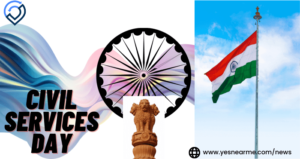CIVIL SERVICE DAY
Every year on April 21st, India observes Civil Services Day to acknowledge and appreciate the dedication of civil servants who play a crucial role in nation-building. It is a civil service day for civil servants to rededicate themselves to public service and reflect on their responsibilities in governance. This occasion serves as a platform for recognizing their contributions, sharing best practices, and encouraging excellence in public administration.
The significance of April 21st dates back to 1947, when Sardar Vallabhbhai Patel, India’s first Home Minister, addressed the first batch of civil servants at Metcalfe House, Delhi. In his speech, he referred to the civil services day as the “steel frame of India”, emphasizing their vital role in maintaining the unity and integrity of the nation. To honor this vision and recognize the hard work of civil servants, Civil Services Day was officially introduced in 2006. Since then, it has been observed annually to celebrate their contributions to governance and policy implementation.
Objectives of Civil Services Day:
Civil Services Day serves multiple purposes, including:
- Recognizing Excellence: The civil service day is an opportunity to acknowledge the commitment and dedication of civil servants in nation-building.
- Encouraging Ethical Governance: It promotes the values of transparency, integrity, and accountability in administration.
- Sharing Best Practices: Officers from different regions and sectors come together to exchange ideas and discuss innovative approaches to governance.
- Awards for Excellence: The Prime Minister’s Awards for Excellence in Public Administration are presented to outstanding officers and initiatives that have positively impacted society.
The Role of Civil Services in Nation-Building :
Civil servants are responsible for implementing government policies and ensuring the smooth functioning of administrative systems. They work across various fields, including law enforcement, revenue collection, foreign affairs, education, healthcare, and disaster management. The key branches of Indian civil services include:
- Indian Administrative Service (IAS): Manages policy implementation and governance at central, state, and district levels.
- Indian Police Service (IPS): Ensures law enforcement, public safety, and internal security.
- Indian Foreign Service (IFS): Represents India in international affairs and diplomacy.
- Indian Revenue Service (IRS): Handles taxation, financial regulation, and revenue generation.
- Indian Forest Service (IFOS): Oversees environmental conservation and sustainable development.
Challenges Faced by Civil Servants:
Despite their crucial role in governance, civil servants face several challenges, such as:
- Bureaucratic Hurdles: Complex administrative procedures sometimes slow down decision-making.
- Political Pressure: Civil servants must navigate political influences while maintaining neutrality and integrity.
- Public Expectations: The demand for transparency, efficiency, and accountability continues to rise.
- Technological Adaptation: With rapid digitalization, civil servants must continuously upgrade their skills to keep pace with new technologies.
A well-functioning civil service day ensures good governance, which is essential for a nation’s development. Ethical governance fosters trust among citizens, reduces corruption, and enhances service delivery. Initiatives like e-Governance, Digital India, and Smart Cities Mission showcase how modern technology is transforming public administration for greater efficiency and transparency.
Celebrations and Events:
On various events and programs are organized, including:
- Seminars and Conferences: Discussions on governance challenges, innovations, and policy improvements.
- Workshops and Training Sessions: Sessions to enhance administrative skills and encourage adaptive leadership.
- Award Ceremonies: The Prime Minister’s Awards for Excellence in Public Administration are given to recognize outstanding work in public service.

